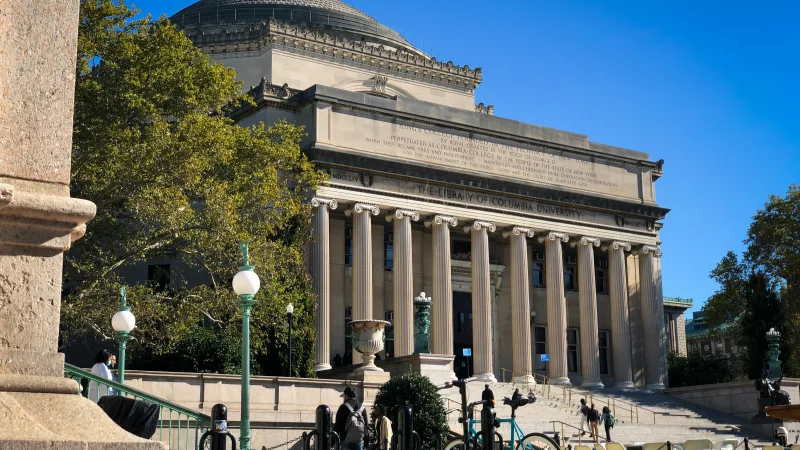
Commitment to diversity and inclusion
The cause of diversity, equity, and inclusion (DEI) is among the most important ones pursued and championed at Columbia Business School. “The faculty, staff, students, and other stakeholders of CBS strive to build and sustain a welcoming and intellectual community that values and respects individuals’ different and shared identities and perspectives, leading to a sense of belonging for all,” according to the school. Columbia is also affiliated with organizations such as the Consortium for Graduate Study in Management and the Forté Foundation, whose aim is to increase representation of different groups in business education, including African Americans, Hispanic Americans, and Native Americans.
Student-led clubs like the Black Business Student Association and Columbia Women in Business further support this mission by providing networks and organizing events that celebrate cultural diversity. With more than 340 members, the Columbia Women in Business club has an annual conference with keynotes, workshops, panels, and more.
Integration with New York City’s business ecosystem
As the home of Columbia Business School, New York City in the United States has its unique influence of the institution. The fast-paced, cosmopolitan environment of the “Big Apple” only adds to the spirit of innovation at CBS. MBA students have access to unparalleled opportunities for experiential learning and professional networking. “And of course, Columbia is at the heart of this world, both on the legal side and in financial services. It is the university most plugged into the heart of New York City, opening doors to institutions of every kind and size for its students and alumni,” highlights Lex Sokolin, who graduated from the JD/MBA program at Columbia.

The school’s location smoothly connects Full-time MBA participants with executives through guest lectures, networking events, and the Executives in Residence program. The latter is a mentorship initiative, which pairs C-level executives (from industries such as technology, retail, healthcare, manufacturing and consumer goods as well as strategy consulting, private equity, financial services, and real estate) with MBA students “to help bridge theory and practice at the very center of business”.
New York City’s unique setting fosters a community that is both diverse and deeply engaged with real-world business challenges.
Professional dress code with room for individuality
In line with New York City’s cosmopolitan feel, Columbia maintains a professional but flexible dress culture. In other words, MBA participants may be expected to have business formal attire for presentations, interviews, and networking events, but a more casual style for daily academic settings. This approach allows students to express their individuality while maintaining a professional appearance. Having a polished style that is modern, yet adaptable to different business settings can work well within New York’s diverse environment.
Relationships: balance of formality and informality
With a highly diverse culture in one of the world’s most buzzing cities, relationships and communication among students and faculty can also shape one’s overall Full-time MBA experience. How do students and professors at Columbia communicate? Columbia Business School generally prefers having some balance between formal and informal relationships. Showing professional respect and acting more formal is considered good etiquette in interactions with faculty, executives, and guest speakers.
Of course, peer relationships and teamwork often lean toward a more informal and collaborative dynamic. Students build strong networks through clubs, study groups, and social events, reflecting New York City’s networking culture, where connections often blend professionalism with a personal touch. This balance creates an environment where mutual respect and camaraderie thrive.
At the forefront of innovation
Columbia Business School is dedicated to staying at the forefront of business education by evolving alongside the industry. The comprehensive, hands-on MBA curriculum ensures that professionals go above and beyond in their preparation for the future of business and management. With seventeen different pathways (optional sequences of electives) available for students to choose from, participants get the opportunity to expand their horizons and experiment creatively. Innovative pathways at Columbia include Climate, Data Analytics and AI, Entrepreneurship, Innovation, and more.
As Lara Hejtmanek, Director of the Eugene M. Lang Entrepreneurship Center at Columbia Business School, says: “Our mission is really to create an opportunity for everyone that comes through Columbia Business School to know what it’s like to be an entrepreneur, to learn how to innovate, and think big ideas that change the world.” In this 2023 interview, she further talks about CBS Startup Week (a multi-day celebration of entrepreneurship and innovation), which featured over 40 CBS startups and hosted panels on key topics like healthcare innovation, venture capital diversity, and sustainable fashion. “Students and alumni had opportunities to pitch their ideas, gain feedback, and even sign their first customers during the event,” Lara Hejtmanek adds.
By embracing the energy of New York City and championing diversity, Columbia Business School and its Full-time MBA do more than teach business skills. Columbia’s MBA helps students become the kind of leaders who can thrive in a changing world. With its innovative curriculum, real-world connections, and commitment to creativity, Columbia prepares professionals from different walks of life to not just follow business trends, but to set them.

Comments